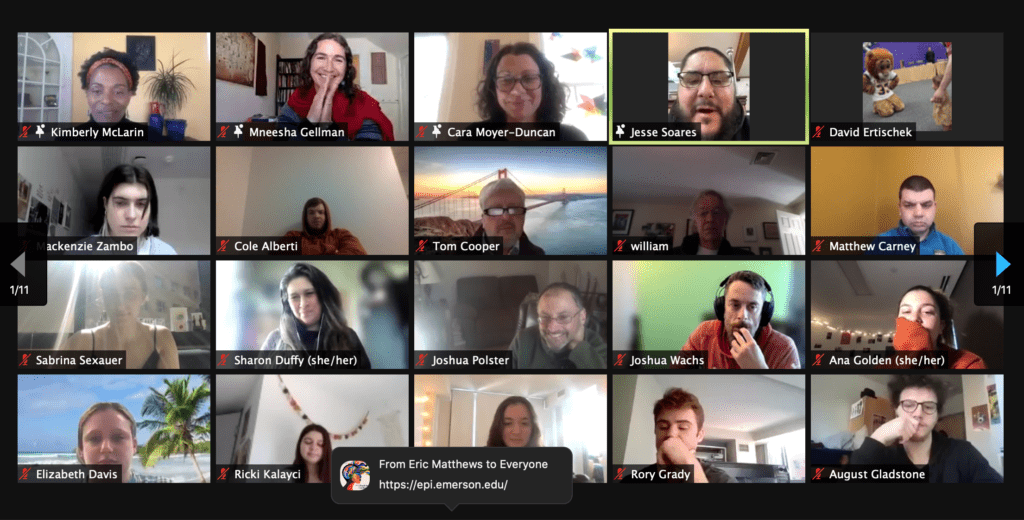Teach-In on Race: EPI Advances Social Justice Through Liberal Arts
The Emerson Prison Initiative (EPI) liberated Jesse Soares.
Soares, who was incarcerated in Massachusetts Correctional Institute (MCI)-Concord, credits receiving a liberal arts education through EPI with not just providing a skill set to come back into the world, but also the ability to thrive and function in it like he had never before.
“Knowing how to hold yourself in a conversation allows options to come to you,” he said.
Soares was one of three panelists in a Friday afternoon Teach-In on Race panel, “The Emerson Prison Initiative: Education as Social Justice”. The other panelists were Marlboro Institute of Liberal Arts and Interdisciplinary Studies associate professors Mneesha Gellman, EPI director, and Cara Moyer-Duncan, EPI program coordinator. They were joined by moderator Kim McLarin, Writing, Literature and Publishing associate professor and EPI faculty member.
More than 200 people attended the panel, which began with an Emerson Productions video about EPI. The mission of EPI is to provide historically marginalized individuals the same education that Emerson students receive on the Boston campus. EPI provides a liberal arts education, as opposed to the vocational training programs that are more commonly offered to prisoners.
Soares was one of 20 of the inaugural EPI cohort at MCI-Concord. Next year, the first class is expected to receive bachelor’s degrees.

Soares said he has since gone on to work in jobs he feels he wouldn’t have been hired for prior to EPI.
He learned how to conduct himself during an interview, how to approach people, and what messages his body language sends to interviewers. He said sometimes one may need to tone down their aggressiveness, which in some cultures can be misconstrued.
He’s also used his education to help other incarcerated individuals learn how communicating effectively can benefit them in their lives, such as at probation hearings.
“Their freedom is on the line,” said Soares.
Moyer-Duncan said she was kept on her toes by Soares’ tough questions when he was a student.
Statistically, the U.S. is the global leader in incarceration, with 2.2 million individuals incarcerated, and another 4.5 million on probation.
“Poor people and people of color are overly represented in prisons and jails,” said Moyer-Duncan. “The vast majority of them are not in prison because they’re bad people, but because society failed them.”
Factors such as violence, racism, inequity, foster care, courts, housing, and often being denied quality education, cause this failure, said Moyer-Duncan.
McLarin raised the issue of individual obligation versus societal obligation, posing a philosophical question: Who needs to be redeemed: incarcerated individuals or society?
Gellman believes that education is a human right. She said education is a powerful tool that allows people to move throughout the world, expand personal experiences, and thus enables people to make a greater societal impact. McLarin agreed, and said that is one of the main reasons she wanted to be part of EPI.
Soares said that individuals being offered higher education can positively affect those around them. That runs contrary to the punitive nature of prison. He said it’s foolish to believe that putting men together to bond over not wanting to be in prison will prevent recidivism.
During a Q&A portion, panelists were asked about how supportive MCI-Concord is of the program. They are symbiotic entities, and there is always room for improvement, said Gellman.
Gellman also explained how the cohort was chosen. Informational sessions were offered to prisoners. Applicants needed to have a high school education or high school equivalency. Then five faculty ranked the 100 applicants and 40 were selected for interviews. From that 40, the inaugural class of 20 was selected.
“We’re really looking for a creative spark,” said Gellman. “It felt like a very true Emersonian process.”
Categories